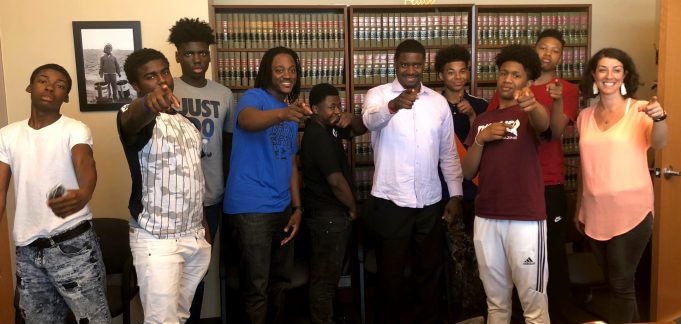[With the launch of their new Strategic Framework and its commitment to Black Excellence, MMSD Superintendent Jennifer Cheatham is offering up her monthly column space to those who are helping to make that vision come to life. This week it is Leigh Vierstra, beloved Madison East teacher and lead teacher of the MicroSchool prototype, an innovation MMSD launched in the last eight weeks of school to support Opportunity Youth. ―Ed.]
“Troubled,” “challenged,” or “unsuccessful” are the many ways that my students at the MMSD Microschool were labeled in the media. I, too, was guilty of believing that narrative until I was given the chance to learn from them and realize their true power and brilliance.
As a Madison community member, I grew up hearing the phrase “Madison is a liberal bubble surrounded by reality.” I spent the first portion of my life living in this metaphorical bubble and believing that racism did not exist here. I went to school with kids of all races, had friends from all walks of life, and did not know a single white supremacist. So racism, according to the definition I was taught year after year, did not exist.
It was not until I worked alongside the students at the MicroSchool that I learned the deep, quiet racism that is constantly simmering in and around Madison and how the labels, such as the ones put on my students, not only stoke the embers of racism here in Dane County but would become the very thing we would need to fight against.
As a long-time educator and advocate for youth in Madison, I am very aware of the achievement gap and the lack of opportunities for our Black and Brown youth. In fact, I have worked hard over the last decade to shift the outcomes our system produces for students of color. So, when I was asked to join the MicroSchool this past March I said, “yes” without hesitation. I knew that I wanted the chance to grow a new program designed to support and lift up the voices of those that historically have been silenced and ignored.
I went into the program with wide eyes and an open heart. But what really happened over the 10 weeks was a difficult reckoning with myself about the deep assumptions and biases that I have collected and carried with me for far too long. I learned that if I was going to be the teacher these kids deserved and were owed, I would need to drop the savior complex, critically push on my assumptions, and see my students for who they are.

Early on at the MicroSchool, I remember feeling shocked when we had a brilliant debate over the power of language and whether censorship of certain words should be allowed. One student connected his argument to real world experiences while others referenced readings and work they had studied in previous courses. The discussion was fantastic and I learned a lot about their perspectives. But later I had to ask myself why I was so impressed by this debate. What surfaced was the hard, uncomfortable truth that I did not originally believe that “troubled” youth could have academic conversations like this one. It pains me to admit this. However, I resolved to change the narrative that existed within both myself and our community by confronting this head on; leaning into the discomfort and letting my students and and their stories guide my journey forward.
My path forward was not easy. I tripped often. I stumbled backwards and forwards but with the compassion and support of my students, my colleagues, and the families that surrounded the MicroSchool, I learned to listen to a different narrative and to actively challenge the narratives that don’t represent my students.
I learned that each student at the MicroSchool was an individual to be seen. Each student has a name and their own powerful, beautiful, and sometimes painful story. They are inherently brilliant: writers, engineers, great debaters, and math wizards. Kids that love to read but were not challenged. Writers that feared the red pen, and so they stopped. Designers who were encouraged to play sports and not join the engineering club. What came from their stories is that the “troubles” and “challenges” they faced were not intrinsic to their characters but rather caused by the systems and situations that have trapped them – systems that we are responsible for.
The MicroSchool was a place of healing, for all of us. In this environment, outside of our traditional education systems, I watched these students blossom. And when I unpacked my biases to see these students for who they really are, I became open and able to foster their brilliance.
As I come to terms with the truth that my community is not the liberal, anti-racist mecca that it has claimed to be and the painful realization that my naivety has contributed to the persistence of these systems, I commit to this: I commit to listening to other peoples’ stories and intentionally pushing back on the assumptions that bubble up. I commit to seeing all of our students for who they are and the gifts that they each have to contribute. And I commit to working collectively and using my privilege to support and lift up the voices of our students and our community members so that their brilliance, too, can shine.




























